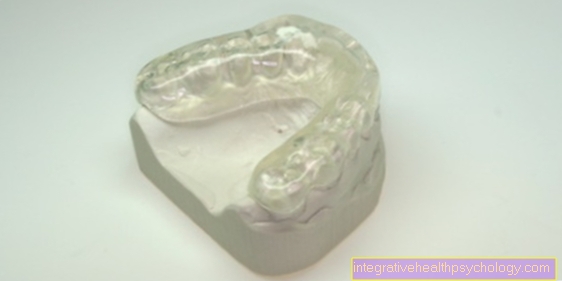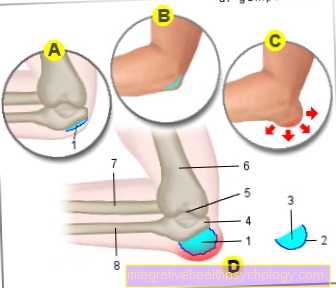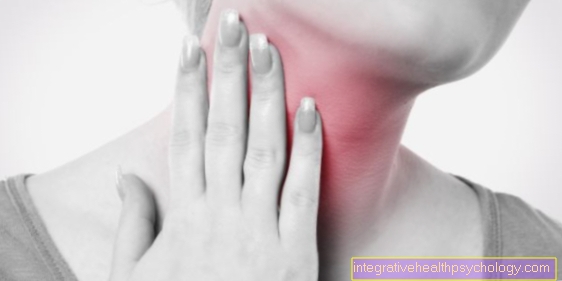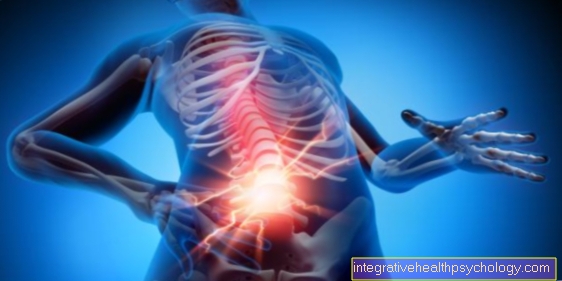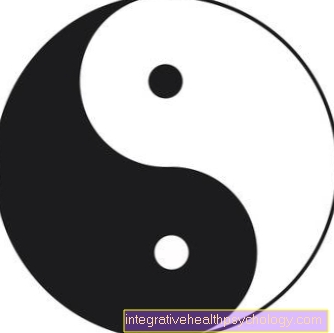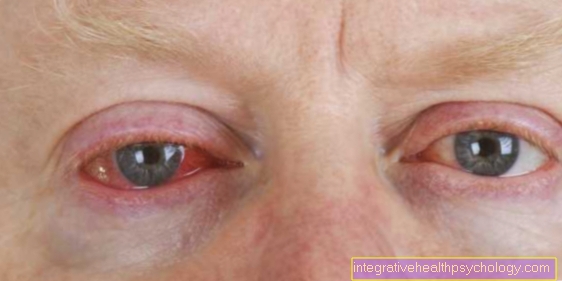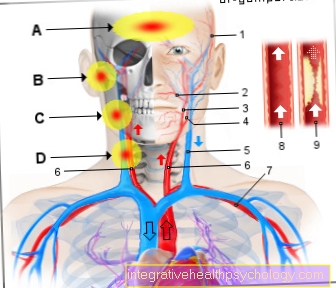Vaccination side effects
Definition - What is a vaccine side effect?
Side effects of vaccinations can be divided into vaccination reactions and vaccination complications.
Vaccination reactions are comparatively common. They occur in around two to 20% of those vaccinated. The vaccine reactions include harmless side effects such as reddening or swelling at the injection site, but also a slight fever or a feeling of weakness and fatigue. These symptoms are usually completely harmless and go away after a few days.
The situation is different with the vaccination complications. These have become extremely rare today. Vaccination complications include severe and permanent side effects. For example, with live vaccinations, it has occasionally happened that those vaccinated developed the disease against which they had recently been vaccinated.
Read more on the topic:
- Should I get my baby vaccinated?
- Vaccinations in the baby

Causes of vaccination reactions
Vaccination reactions in the form of redness, swelling, pain at the injection site and mild general symptoms are harmless and indicate the normal reaction of the body to the vaccine. This reaction can vary from person to person, so that some people who are vaccinated show symptoms, but others do not.
In both cases, however, the reaction proceeds as follows: The vaccine contains Antigens; these are, for example, capsule or shell components of bacteria or viruses. The immune system recognizes the antigens as foreign and the immune cells react with a slight inflammatory reaction. The area around the puncture site is supplied with more blood. As a result, redness and swelling can appear. The immune system then begins to produce so-called Antibodies. Some of these remain in the body for decades and can react directly and fight against the antigens when they come into contact with the virus or the bacterium against which the vaccine was vaccinated. So the vaccinated does not get sick.
Since every body reacts differently to the antigens in the vaccine, some people even have a mild generalized inflammatory reaction, which manifests itself in a fever or a feeling of weakness. Others do not experience any symptoms.
Read more on the topic: Rash After Vaccination - What Causes It?
These accompanying symptoms suggest a vaccine side effect
Vaccination reactions are harmless and usually disappear after a few days. These include: redness, swelling and pain at the injection site, mild fever, general feeling of weakness or exhaustion, pain in the limbs, muscles or joints, slight nausea or other gastrointestinal complaints, mild headache.
Read more on the topic: Why do you get body aches when you have a cold?
The following symptoms can be signs of more serious side effects: Severe headache with dizziness, nausea, and confusion can indicate meningitis. A high fever in young children can rarely lead to febrile convulsions. A rash, itching, shortness of breath and a drop in blood pressure can indicate a sometimes severe allergic reaction.
Read more on the topic:
- Meningitis symptoms
- Fever in baby after vaccination
- Side effects from vaccinations in the baby
Fever after vaccination
A slight fever after a vaccination is one of the harmless vaccination reactions. These indicate the normal response of the immune system to the vaccine. These temporary symptoms usually disappear after a few days. Especially if it is only a slight increase in temperature, the fever should not be actively lowered with medication, as this can reduce the success of the vaccination.
However, care should be taken with children and babies. In any case, it should be discussed with the pediatrician how to proceed in the case of fever after the vaccination.
If a vaccinated person develops a very high fever and other symptoms such as severe headache, confusion or seizures, a doctor must be consulted immediately or an emergency doctor should be called. These can be potentially dangerous complications. Nowadays, however, such serious processes hardly ever appear.
Read more on the topic:
- Fever in baby after vaccination
- Side effects from vaccinations in the baby
- Fever after vaccination in an adult
- When should I see a doctor with a fever?
Diarrhea is one of the side effects of vaccinations in babies. Read our main article about this: Diarrhea After Vaccination In Baby - Is It Dangerous?
Redness at the vaccination site
Redness at the puncture site is a fairly common vaccination reaction and usually completely harmless. The body reacts to the vaccination with a slight and also desirable inflammatory reaction. The resulting increased blood flow around the puncture site shows up in reddening and sometimes swelling. The reddening at the vaccination site usually disappears completely after a few hours to days.
If the reddening is accompanied by strong general symptoms, such as shortness of breath or dizziness, a doctor should be consulted, as it may be a very rare but dangerous allergic reaction to the vaccine or its individual components (chicken protein, gelatine, stabilizers, preservatives) .
Read more on the topic:
- Rash After Vaccination - What Causes It?
- Baby rash - what is the underlying disease?
- Rash from an allergy
- Food allergy
Pain at the vaccination site
Pain at the vaccination site is another common and harmless vaccination reaction. The pain usually occurs shortly after the vaccination and lasts for a few hours to days. The pain can remain limited to the puncture site, but pain similar to sore muscles can also occur in the entire arm or leg. In both cases there is a slight inflammatory reaction caused by the vaccination.
If the pain persists significantly longer than a few days or if it worsens after a few days, a doctor should be consulted again and the previous vaccination should be reported.
Read more on the topic:
- The pain after a vaccination - this is what you should be aware of
- Can you do sports after a vaccination?
When do the side effects come?
The harmless vaccination reactions often occur a few hours after the vaccination. These include above all the local reactions such as pain, redness and swelling. Symptoms such as limb and joint pain then follow a few hours to a few days after the vaccination.
Fever often does not appear immediately after the vaccination but only after a few days.
Serious complications occur at very variable intervals. For example, an allergic reaction usually shows up very quickly after the vaccination, often after a few minutes. A previously feared complication, the development of the disease against which the vaccine was actually vaccinated, only occurred after several days or weeks. However, such side effects practically no longer occur today.
How long do the side effects last?
As quickly as the harmless vaccine reactions occurred, they usually disappeared again. Redness, swelling and pain around the puncture site will go away after a few hours to days. Fever and other general symptoms also go away completely after a few days to about a week.
Rare and severe complications require medical treatment. The duration of these complaints varies widely. Long-term side effects are rarely observed nowadays.
Treatment / therapy
Many local vaccine reactions do not require treatment. They pass by themselves.
In the event of severe pain and swelling at the injection site, cooling pads or moist compresses can be used. Often this simple measure already leads to a significant alleviation of the symptoms.
If a fever occurs after a vaccination, it should be discussed with the doctor beforehand, especially in children, as to when it makes sense to lower the fever. Mild fever can often be tolerated. In the case of a high fever or in children who have already suffered a febrile seizure, it is better to start lowering the fever early on. Often, already moist compresses can help, otherwise antipyretic medication must be used.
Read more on the topic: Fever suppositories (for babies and children)
Physical rest is usually the best way to combat headaches and body aches. After a vaccination, you should generally refrain from exerting too much exertion, such as exercising.
Read more on the topic: Can you do sports after a vaccination?
Serious vaccination complications always require medical treatment. In the event of very rare symptoms such as dizziness, shortness of breath, impaired consciousness, confusion, severe headache or seizures, a doctor should be called immediately. Symptoms such as these usually require hospital treatment and are potentially life threatening.
What long-term damage can vaccinations cause?
Long-term damage from vaccinations is an absolute rarity these days. Of about 10,000 reported side effects of the vaccination, only a little over 100 can actually be attributed to the vaccination. Still, some myths persist. The thesis that autism, diabetes or other chronic diseases occur more frequently due to vaccinations has by no means been confirmed.
Read more on the topic: Diabetes in children
Sudden infant death syndrome is also not a result of vaccinations. In the case of cot death, the opposite even seems to be the case. One study showed that children who died of sudden infant death syndrome were often vaccinated less often or later.
Up until the end of the 20th century it happened in rare cases that the polio vaccination triggered the polio, against which it was supposed to protect. However, after the dead vaccination was introduced, such cases could no longer be observed.
Read more on the topic: Vaccination against polio
The vaccination against measles is also a live vaccination. In the case of the measles vaccine, there is no danger whatsoever for healthy people. The individual cases in which children reacted to the measles vaccination with measles encephalitis, i.e. encephalitis, were severely immunocompromised children. However, the vaccine was not approved for such children.
A few years ago, the Pandemrix vaccine against swine flu was suspected of causing narcolepsy, a disease that causes people to fall asleep suddenly and uncontrollably. However, this theory has not yet been confirmed.
More information
- Should I get my baby vaccinated?
- Vaccinations in the baby
- Meningitis symptoms
- Fever in baby after vaccination
- Side effects from vaccinations in the baby
- Fever in baby after vaccination
- Side effects from vaccinations in the baby
- Fever after vaccination in an adult












.jpg)
